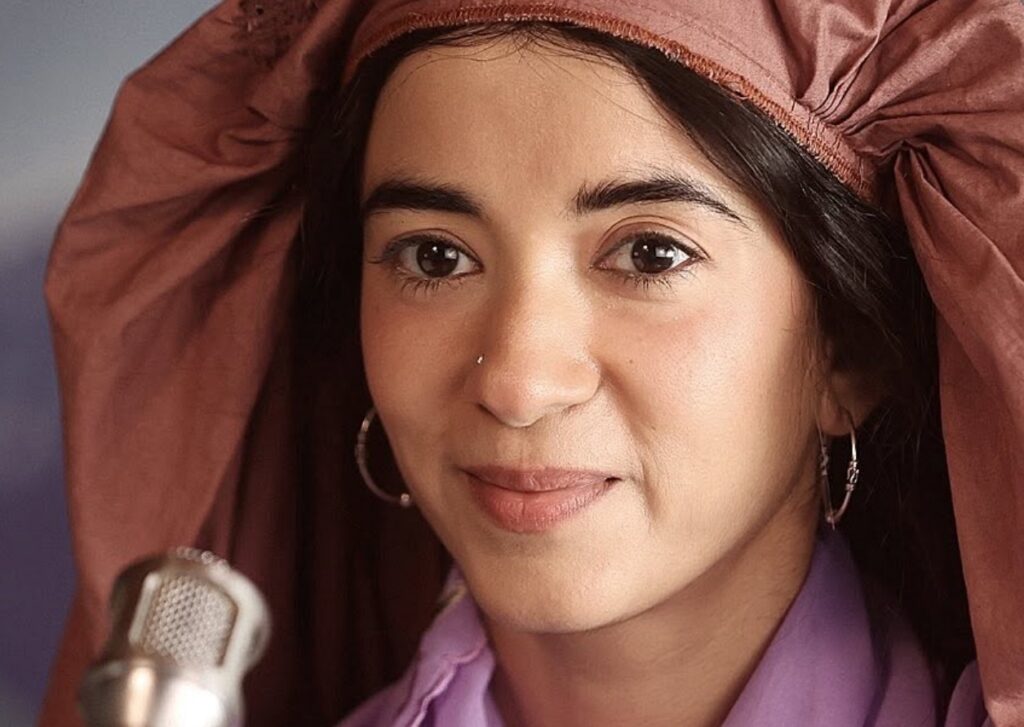Songs of Paradise, directed by Danish Renzu and streaming on Prime Video, is inspired by the life of legendary singer Raj Begum and traces her remarkable journey to become the first prominent female singer from Kashmir. While it is a film that, no doubt, needed to be made, a flat, simplistic treatment of Begum’s extraordinary life undoes the heartfelt, noble intention of its makers.
Rumi (Taaruk Raina), a music researcher and Berklee College of Music alumnus, travels to Srinagar for an interview with the legendary Kashmiri vocalist, Noor Begum. Initially reluctant to share her story, Noor eventually agrees. The film takes us back to 1954, when, contrary to the aspiring ideals of a still newly Independent nation, women were still shackled and expected to remain confined to domestic duties and marriage. Noor’s story begins with her progressive father, a poor tailor (Bashir Lone), who encourages her to pursue her dreams of music, despite the scorn of her homemaker mother, Hameeda (Sheeba Chaddha). Working as a housemaid in the home of a local musician (Shishir Sharma), Noor’s passion for singing catches his ear. Recognising her potential, he becomes her mentor, guiding her toward a music career. As Noor rises, winning an award at a song competition on Radio Kashmir, her life takes a dramatic turn…
Songs Of Paradise‘s heart lies in trying to create an intimate portrait of Noor Begum, a woman who defied the confines of her time. Her progressive mindset is evident not only in her passion for singing but also in her defiance of traditional norms, such as her choice of whether to wear a burkha or not. As an employee at the radio station, she challenges gender inequality, boldly demanding fair remuneration without hesitation. These moments underscore her determination to break societal constraints and assert her agency in a world that seeks to silence her. Renzu, alongside co-writer Sunayana Kachroo and dialogue writer Niranjan Iyengar, has crafted a tale free of manipulative musical cues or emotional shortcuts. The narrative is unhurried, its pacing deliberate. It is a film that invites contemplation rather than spectacle, urging the audience to linger in the small, fleeting moments that define a life. Moreover, in a world where men hold the power, it is unsurprising that the male figures in Songs of Paradise – Noor’s father to her music teacher and husband – all play crucial roles in supporting her pursuit of her dreams. Their presence is not one of dominance. But rather an essential part of Noor’s journey, framing their contributions as necessary to her success, and not merely as a reductive trope.
Despite all its promising elements, Songs Of Paradise, sadly, struggles to create an impactful experience. While the narrative sets an emotionally rich foundation, it ultimately fails to achieve the resonance it aspires to. The conflicts are resolved much too easily, diluting the overall triumph of the protagonist. Though the film aims for subtlety, this results in a rather simplistic story that feels somewhat bland, lacking layering and complexity. The screenplay feels far too light, lacking the dramatic urgency and emotional resonance needed to elevate the stakes. Also, when a film is set in Kashmir, sidestepping the region’s political turmoil is taking the path of least resistance and the most convenience. By avoiding engagement with the complex socio-political landscape that has shaped the lives of its people, the film misses the opportunity to deepen its narrative.
Saba Azad, as the young Noor Begum, fully inhabits the character, with her body language and dialogue delivery. Soni Razdan, portraying the older Noor, is equally compelling in her nuanced performance. Bashir Lone brings a simplicity and warmth to the role of Noor’s supportive father, creating some heartwarming moments, while Sheeba Chaddha is effective enough as the mother steeped in tradition, orthodoxy and patriarchy. Shishir Sharma, playing Noor’s music teacher, and Zain Khan Durrani, as her husband Azaad, are fine, though the latter, in particular, suffers from a unidimensional, too-good-to-be-true characterization. Lillete Dubey scores in her cameo as Noor’s supportive aunt-in-law but Taaruk Raina, in the role of Rumi, unfortunately doesn’t leave a lasting impact, as his character feels underwritten and fleeting.
Vincenzo Condorelli’s evocative cinematography, with its keen attention to detail, ensures that Kashmir is not reduced to mere postcard images, but is portrayed soulfully with its raw, lived-in beauty. Hemanti Sarkar’s unhurried editing complements this, allowing the story to unfold at a natural pace. The sound design by Bibin Dev and Savitha Nambrath enhances the film’s atmosphere, while Sheetal Iqbal Sharma’s costumes reflect the characters’ personalities and the period with great care. The beautiful Kashmiri songs, so integral to the narrative, deepen the cultural resonance of the film.
Songs Of Paradise offers an honest exploration of one woman’s triumph over adversity, but it never fully captures the complexity of her victory. Despite its strong thematic ambition and visual beauty, it leaves the viewer yearning for a deeper, more profound and satisfying emotional payoff.
Hindi, Kashmiri, Urdu, Drama, Color


